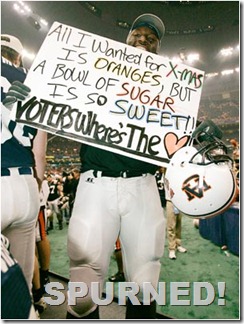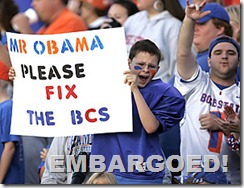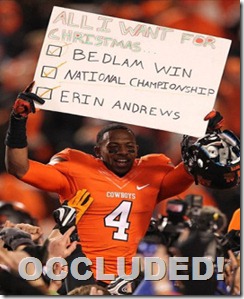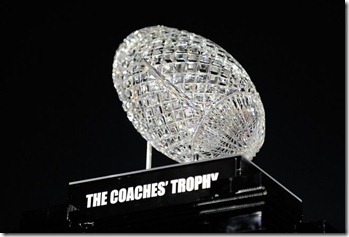Michigan Museday Sanity Checks Postseason Ideas

In 1997, back when 7-point leads were comfortable and safeties were meant for hitting people while corners did the covering* undefeated and no-brainer No. 1 Michigan went to the Rose Bowl. That was pretty cool. We faced Washington State and Ryan Leaf back when he was Ryan Leaf and not Ryan Leaf, Woodson made that interception to stop the comeback keep Michigan in striking distance (wow I forgot that context), and woo forever.
Meanwhile the conferences that weren't the Big Ten and Pac Ten were into their third year of a "bowl coalition" to match up the best two teams possible. Undefeated kick-ball-in-OT-vs-Mizzou Nebraska went to that and beat the tar out of Tennessee. The AP declared the next day's Daily cover something to hang on your wall forever, the coaches gave Osborne his send-off gift, and it didn't matter that there was a co- because starting next year there would be the perfect championship system to determine an unquestionable champion…for 1997.
-----------------------------------
* This wasn't at all true unless you literally had Charles Woodson in your backfield. Dude should win an award for that or something.
-----------------------------------
Getting' Jiggy With It isn't working. This has been the BCS's problem since its inception. In 1998 it was  the perfect system to pit the last big conference undefeateds against each other, but then it left out an undefeated minor conference team and arbitrarily selected one of several similar 1-loss teams to face unquestioned numero uno Tennessee. Every year there was at least some complaint they patched with an overreaction on the next one. Team A beat Team B beat Team C who got in? Overrate head-to-head and dump half the computers. Too influenced by pollsters? Let's get more computers. Teams running up the score? Dump the margin of victory. AP and Coaches No. 1 USC left out of a three-horse race? Overrate the polls. Undefeated SEC team left out of a three-horse race? Overrate schedule strength. Boise State keeps going undefeated by playing Wyoming 12 times? Autobid the little guys. Two Big Ten teams about to rematch? Oh the pollsters can jig the system. Wait the pollsters are jigging the system? Kick 'em out and get our own pollsters. Two SEC teams about to rematch? Dammit.
the perfect system to pit the last big conference undefeateds against each other, but then it left out an undefeated minor conference team and arbitrarily selected one of several similar 1-loss teams to face unquestioned numero uno Tennessee. Every year there was at least some complaint they patched with an overreaction on the next one. Team A beat Team B beat Team C who got in? Overrate head-to-head and dump half the computers. Too influenced by pollsters? Let's get more computers. Teams running up the score? Dump the margin of victory. AP and Coaches No. 1 USC left out of a three-horse race? Overrate the polls. Undefeated SEC team left out of a three-horse race? Overrate schedule strength. Boise State keeps going undefeated by playing Wyoming 12 times? Autobid the little guys. Two Big Ten teams about to rematch? Oh the pollsters can jig the system. Wait the pollsters are jigging the system? Kick 'em out and get our own pollsters. Two SEC teams about to rematch? Dammit.
This is what a process looks like when it has no forethought. I could say the same about many playoff proposals. Every year there's a perfect system that would be perfect for that year if we had that system. What we should be asking for is a system that would be good enough every year.
Good enough is good enough. Math says if you found the best team in a 120-team league after 12-13 games of unbalanced schedules, you just got lucky. What we're shooting for here is something where only the homeriest homer of Domer will be claiming their team got duked. The last team in should have an ironclad case, were they to emerge victorious, to be the No. 1 overall team, but the first team out should not have a very good case to be given that chance.
Autobids are bad (for this). This includes conference champions, sorry. The championship games help clear things up by giving contenders an extra bellwether. However a two-division format means 8-4 teams can beat 12-0 teams they lost to the first time. The Big Longhorns Conference still technically exists. So does the Big East. Bowl tie-ins for conference champions are great and should stay but nothing should be automatic about a playoff.
The right process is some kind of playoff. I'd be fine if it just went back to bowl games and polls to determine the National Champion, but the game has gone national and there's money to be made.
The question is how many teams should be in it. The current system has two teams. The Plus-One proposal discussed by the conferences last year is basically four with some measure of flexibility. Brian wants six, which is the fewest that will accommodate undefeated mid-majors most years. Hinton proposed 10, which reasonably fits most of the good 2-loss teams.
What I'd like to do here is UFR the BCS years past and see which of these playoff systems, the BCS, a Plus-One, Brian's, or Doc Saturday's, would have been best.
 1998: Slightly similar to this year, with one undisputed team on top, then lots of 1-loss teams to pick from. Four-teamer is #1 Tennessee (12-0), #2 FSU, #3 Kansas St, and #4 Ohio State. Six teamer includes #5 UCLA and #10 Tulane. Ten teams nets #6 Texas A&M with 2 losses, #7 Arizona with 1 loss, #8 Florida with 2 losses, and #9 Wisconsin with 1 loss (the Big Ten Champ). Ideally: Brian.
1998: Slightly similar to this year, with one undisputed team on top, then lots of 1-loss teams to pick from. Four-teamer is #1 Tennessee (12-0), #2 FSU, #3 Kansas St, and #4 Ohio State. Six teamer includes #5 UCLA and #10 Tulane. Ten teams nets #6 Texas A&M with 2 losses, #7 Arizona with 1 loss, #8 Florida with 2 losses, and #9 Wisconsin with 1 loss (the Big Ten Champ). Ideally: Brian.
1999: The first obvious matchup of two undefeated BCS teams, #1 Florida State, and #2 Virginia Tech. Clear #3 Nebraska stands apart from a ton of 2-loss teams like Tennessee, Bama, Michigan, Wisconsin and MSU. 1-loss KSU is in there too. 10 teams works if you take Marshall over 3-loss Florida or Penn State. Ideally: BCS
2000: #1 Oklahoma, #2 Florida State, who lost to #3 Miami, who lost to #4 Washington. #5 V-Tech, and #6 Oregon State also had 1 loss each. After that is a lot of 2-loss BCS teams. The BCS system generated all sorts of controversy for teams 2-4 being mostly indiscernible, and lo more overreactive rules were written into the BCS codec. Ideally: Brian.
 2001: Another year where 1 is clear but the rest ain't. #1 Miami, then #2 Nebraska, #3 Colorado with 2 losses but who just beat Nebraska, #4 Oregon with Joey Harrington. Getting to six includes 2-loss SEC teams #5 Florida and #6 Tennessee. You're leaving out 1-loss Illinois and 2-loss Texas here but 2-loss Tennessee was a shoe-in for the national championship game until falling in the SEC championship. An expanded field of 10 also draws in Stanford and Maryland. Ideally: Plus-One.
2001: Another year where 1 is clear but the rest ain't. #1 Miami, then #2 Nebraska, #3 Colorado with 2 losses but who just beat Nebraska, #4 Oregon with Joey Harrington. Getting to six includes 2-loss SEC teams #5 Florida and #6 Tennessee. You're leaving out 1-loss Illinois and 2-loss Texas here but 2-loss Tennessee was a shoe-in for the national championship game until falling in the SEC championship. An expanded field of 10 also draws in Stanford and Maryland. Ideally: Plus-One.
2002: #1 Miami, #2 Ohio State, HUGE GAP, #3 Georgia, #4 USC, #5 Iowa, #6 Washington State. This is the year you want to just skip to an N.C. game because the top two are undefeated and everyone else has 1 or 2 losses against easier schedules. A 10-team playoff includes Oklahoma, Kansas State, Notre Dame, and either Texas or Michigan. Could you really build a strong argument that the 2002 team is a national title contender? Ideally: BCS
2003: A top tier of three 1-loss teams: #1 Oklahoma, #2 LSU, #3 USC, then and easy cutoff between #4 Michigan and #5 Ohio State, #7 Florida State. Again you're picking between 2-loss teams for the 6th spot. Here I drew in FSU over Texas for winning their conference (not an auto-bid but it can count). Whichever team that is would have to play in Ann Arbor under the Brian plan to avoid having a repeat of M-OSU in the same place a week after The Game. The next four teams would include Texas, Tennessee, Miami (YTM), and either K-State or 1-loss Miami (NTM). This is a great case for a 4-team  playoff, a decent case study for a 6-teamer, and shows how a 10-teamer is getting down to 1-loss MAC teams. Ideally: Brian.
playoff, a decent case study for a 6-teamer, and shows how a 10-teamer is getting down to 1-loss MAC teams. Ideally: Brian.
2004: Again a clear top tier: #1 USC, #2 Oklahoma, #3 Auburn. A fourth is #5 Cal or #4 Texas, a sixth undefeated #6 Utah. Undefeated #9 Boise State is out there too. Expanding to 10 includes 2-loss Georgia, Virginia Tech, and 1-loss (not Big East yet) Louisville. Ideally: Brian.
2005: #1 USC, #2 Texas, BIG GAP, #3 Penn State, #4 Ohio State, #5 Oregon, #6 Notre Dame or maybe #11 WVU? Like '02 this is a "just play the NC" year. Twice in four years is enough to write a fix into the system for this sort of thing (more on this below). A 10-teamer includes Georgia, Miami (YTM), Auburn, and either VT, WVa., or LSU, or ??? – there are fully 10 two-loss BCS teams. Ideally: BCS.
2006: A one and many situation again. #1 Ohio State, then pick one from #3 Michigan (no need for shenanigans), #2 Florida, #5 USC, #4 LSU, #8 Boise State. I slotted in undefeated Boise over 1-loss Louisville and Wisconsin, and also moved USC over LSU for winning their conference. Going to 10 includes them plus probably Auburn and Oklahoma; after that is Brady Quinn's 10-2 Notre Dame who don't belong near an NC game except in ND fans' minds. Ideally: Brian.
 2007: Sixer would have #1 Ohio State, #2 LSU, #3 Virginia Tech, #4 Oklahoma, #5 Georgia, and #10 Hawai'i. This might as well be 2011 with another pretty sure-fire #1 and some confusion after that. This would be a hard call between a BCS game (LSU's a strong #2 while the other 1-loss team is #8 Kansas) and a 6-teamer. Going to 10 includes Mizzou, USC, Kansas, and West Virginia, who are indiscernible from Georgia and VT but cuts off before 10-2 Arizona State. Ideally: Doc Sat.
2007: Sixer would have #1 Ohio State, #2 LSU, #3 Virginia Tech, #4 Oklahoma, #5 Georgia, and #10 Hawai'i. This might as well be 2011 with another pretty sure-fire #1 and some confusion after that. This would be a hard call between a BCS game (LSU's a strong #2 while the other 1-loss team is #8 Kansas) and a 6-teamer. Going to 10 includes Mizzou, USC, Kansas, and West Virginia, who are indiscernible from Georgia and VT but cuts off before 10-2 Arizona State. Ideally: Doc Sat.
2008: This was the season that wasn't played. Henri the Otter of Ennui wins. Okay fine this is a mess of seven 1-loss teams at the top and two undefeated mid-majors, one of which played Michigan and respectable MWC schedule. Sixer ends up with #1 Oklahoma, #2 Florida, #3 Texas, #4 Bama, #6 Utah, and #5 USC. Sorry #9 Boise State. After that there's 1-loss Texas Tech and Penn State and 2-loss Ohio State. If you're okay with leaving out Boise for USC it's Ideally: Brian.
 2009: It's not 2004 despite three undefeated BCS teams since the Big East was by now a mid-major. #1 Alabama and #2 Texas in easy, and #3 Cincy and #4 TCU after. Going to six includes #5 Florida and #6 Boise State. Only Florida among the six has a loss. The next four are Oregon, Ohio State, Georgia Tech and Iowa, all with 2 losses so 10 teams would only muddle things that are fine, but this year would work well as BCS, Plus-One, or the Cook Six Plan. Ideally: Brian.
2009: It's not 2004 despite three undefeated BCS teams since the Big East was by now a mid-major. #1 Alabama and #2 Texas in easy, and #3 Cincy and #4 TCU after. Going to six includes #5 Florida and #6 Boise State. Only Florida among the six has a loss. The next four are Oregon, Ohio State, Georgia Tech and Iowa, all with 2 losses so 10 teams would only muddle things that are fine, but this year would work well as BCS, Plus-One, or the Cook Six Plan. Ideally: Brian.
2010: Top two are easy #1 Auburn and #2 Oregon. Top six hauls in #3 TCU, #4 Stanford, #5 Wisconsin, and #6 Ohio State. Again this is tailor-made for six teams (three undefeated, three with one loss). It's tempting to go with the NC format, TCU be screwed, but six is just fine. The 2-loss Sooners and Razorbacks, and 1-loss MSU and Boise would draw into a 10-team field. Ideally: Brian.
2011: Two is a rematch of #1 LSU and #2 Alabama. Four is #3 Oklahoma State, plus either #4 Stanford or #5 Oregon who beat them.  And #7 Boise State, now with BCS scheduled teams and TCU. I'm giving Boise the entry in a six-team system over Arkansas so we don't have half the field from one conference. Ten teams would be a bitch (Hinton includes Clemson in there—the BCS standings would have four SEC teams in a 10-team field). Ideally: Brian.
And #7 Boise State, now with BCS scheduled teams and TCU. I'm giving Boise the entry in a six-team system over Arkansas so we don't have half the field from one conference. Ten teams would be a bitch (Hinton includes Clemson in there—the BCS standings would have four SEC teams in a 10-team field). Ideally: Brian.
So you're saying the boss's system is better?
Yeah, I…wait I have a bolded subconscious alter-ego too now?
No I'm Ace's bolded alter-ego, filling in.
Where's mine?
The coaches like me better. Boom BCS'ed!
Really?
He got bored right around the time you started going over every year since 1998.
:( So final score is Brian 9, BCS 3, and 1 each for a Plus One and Doc Saturday's 10-team bowlstravaganza. So six is the best solution, but far from a perfect solution. This makes sense when you look at an average season. For this I can even give you a
Ch..
..art of how many of each type of contender we've had in 14 Final BCS Standings:
| Team type | Avg. per season |
|---|---|
| Undefeated BCS Teams | 1.4 |
| One-loss BCS Teams | 3.4 |
| Undefeated Mid-Majors | 0.8 |
| Two-loss BCS Teams | 5.8 |
This is a loose argument for a six-team playoff. There's a reasonable chance of having four or five undefeated or 1-loss BCS teams, plus one perfect mid-major, every year. Those mid-majors aren't going away with TCU and Boise joining one of the recently pilfered BCS leagues; you can see Marshall and Tulane popped up before they did. However any given year should expect plenty of 2-loss BCS teams, more than you want to pick from to expand to a field of 10. Six draws an imaginary circle around the top three rows and suggests most years you can get between 5 and 6 comfortably competitive playoff contenders.
But then you still have 5/14 years when that's not ideal in just this little sample. Is that acceptable?
No it isn't. Even if you figure the perfect Plus-One year and the perfect Doctor Saturday year wouldn't bother too many people if we rammed them into a six-team field, what's unacceptable are those three BCS wins. It's better than the BCS's 3/14 but hell some years you just wanna see Ohio State versus Miami (YTM), or Florida State versus Vick, or the Pete Carroll's Hollywood All Stars versus the Vince Young Show. So:
Let's have that!
Let's propose the six-team playoff system I'll call Brian-Plus:
- Six-team field chosen by a select committee/cabal like in basketball
- #3 and #4 hosting #6 and #5 respectively in home field quarterfinals the week after the conference championships (mid-majors who get in will almost certainly fall in that that 5- or 6-seed range to preclude too much blue turf in Round 1)
- Semifinals in Sugar and Orange Bowls on Jan. 1.
- Final a week later in the Rose Bowl.
- All other bowls left alone; bowls can schedule Round 1 losers. Rose Bowl can have its regular game a week earlier with the parade.
…but that seeding committee can also choose to declare a clear national championship game. So basically when they meet they decide a.) Is it two or six this year, and then b.) If it's six who gets in and how are they seeded? On years when there's a clear two-team BCS game we revert to something like the current system, with bowl tie-ins for the regularly scheduled bowl games.
I would also suggest removing one game from the regular season schedule (if only this would solve the FCS problem) so that the conference championships are played over Thanksgiving and Round One of the playoffs be a week after. Maybe that's pushing it.
December 13th, 2011 at 1:43 PM ^
at least right now. Partly because of the extra games, and partly because it undermines the bowl system too much. It wasn't long ago, e.g., that Michigan would play 12 games a year max (11 game regular season and a bowl). With the conference championship game we've jumped up to 14. Now we want to potentially jump to as many as 16. But even that isn't nearly as big of an obstacle as what a multi-round playoff does to undermine the relevance and tradition of the bowls.
December 13th, 2011 at 11:30 AM ^
Colorado just beat Nebraska, not Miami. I was there.
December 13th, 2011 at 11:50 AM ^
oops. obviously meant nebraska.
December 13th, 2011 at 11:39 AM ^
I get the reasoning for having two formats and using the one that fits best in a given year. But the overall idea (the Brian+ plan, etc) is a really good one that it would be great to see get into the national discussion, and just seems like that point about switching between 2 or 6 is a sticking point that people won't see past. Instead of "that well-thought-out playoff plan that would be best for IDing the best team from year to year" people will see it as, "that crazy idea where a committee chooses a different scheme each year" and they won't get past that.
December 13th, 2011 at 12:06 PM ^
A zone read play for the BCS committee! How about adding a pass option?
December 13th, 2011 at 12:27 PM ^
I think that any playoff system is going to lead to just as much controversy as we have now. It's just human nature. The 9th team in a world with an eight-team playoff will complain just as loudly as the 3rd team does now. The explanation that seems reasonable today ("How much can you complain when you're 10-2?") won't matter because people will just point out that a wild card team can win the Super Bowl...As imperfect as it is, I'm for sticking with things the way they are as far as the national championship game.
December 13th, 2011 at 2:40 PM ^
We can't be afraid of people who don't have a point complaining. The people complaining who do have a point are those a system should strive to placate.
The "Wild Card can win the Superbowl" system is a system we Do Not Want for college football. That type of playoff is essentially a second season, a tournament rather than an extension of the outcome of the regular season. NHL and NBA have postseasons like this too where the entire season is basically Round 1 of the playoffs that doesn't even knock out half the league (rendering their seasons only a little meaningful). MLB used to be closer to this ideal but they're moving further and further away (I've been arguing for the "Pennant" to revert to being something achieved by each league's best overall record, and a thing to be cherished in its own right).
College football's final should be closer to the completion of a whole, not a second season. That would be the worst thing!
The question of determining whether you belong in the playoff field or not isn't "am I better than the last guy in?" but "was my season good enough compared to the best team so as to warrant a head-to-head between us to settle it?"
A hypothetical No. 7 Michigan team would be a lot like the '99 team. Would you scream bloody murder if 1999 Michigan wasn't let into a 6-team field of Florida State, Michael Vick, Nebraska, Kansas State, Bama, and Wisconsin? Maybe, because we beat Wisconsin that year. But the real question isn't who gets the sixth spot, but who deserves a crack at the top spot? There may be an argument that the ACC prior to the Miami/VT/BC expansion was weak enough that Weinke, Warrick and 1999 FSU projected to 2 losses in a Big Ten that was just as good as the SEC is today.* But that's the argument you would have to make to have any relevance, not whether we deserve that chance more than Wisconsin.
By the way once you're getting to 10 teams we're accepting teams like Michigan in 2002, or Michigan in 2011. By that point we really wouldn't be claiming to deserve a shot at LSU.
* Iowa was down but looking back it's unbelievable how strong the conference was. Ohio State was rebuilding after peaking in '98 with Boston, Winfield, Katzenmoyer, Montgomery, Germaine, Moore, Miller, and Bartholomew. Michigan had Brady and A-Train and leftover national champions interspersed with sophomores from our best recruiting class ever. Wisconsin returned almost all of its '98 Rose Bowl winning team, including Heisman Winner Ron Dayne. Purdue was approaching its Joe Tiller zenith behind a junior Drew Brees. Illinois was becoming a contender with Kittner (and beat us). Minnesota was in Mason's third year with those awesome RBs and Tyrone Carter. Michigan State under Saban reached the height of that program. And then Penn State was supposed to be the best of all of us, with the No. 1 and No. 2 first overall picks in that year's NFL draft. All told the Big Ten had the #4, #5, #7, #11, #18, #24 and #25 teams. That's not including Northwestern under Randy Walker who could bite anybody. FTR Michigan would be in a 6-team playoff in '99 unless they took Wisconsin (Big Ten champ) and Michigan State (who beat us).
December 13th, 2011 at 4:50 PM ^
"The 'Wild Card can win the Superbowl' system is a system we Do Not Want for college football."
Unfortunately, in any playoff, that's what you're gonna get. In any given year, the difference between the number #6 and #1 team is just not that big. (Not to mention that the NFL wild cards have to go through 4 teams to get the trophy, and these scenarios involve a #6 team going through only 3.)
Here's a fun thought experiment. Take any "best" team from the last 25 years. Then take the #6 team from that year and match them on a neutral field. Use any reasonable metric to simulate the results 10,000 times. The massive underdog will win no less than 1/10 of the games (probably a lot more, actually); let's set that as the odds.
The odds of that underdog winning at least plus-one game over the first five years are about 1 - (.9 ^ 5), or about 41%. They go over 50% by the seventh year.
Leaving aside the numbers, the point is that while there's a huge difference between the top teams and the worst teams (or even the mediocre teams), the top teams are just not that different from each other.
That in turn means that anyone who complains about being left out in a playoff does have a point; the odds that they could win 3 straight games against the best in the country are simply not that small.
December 13th, 2011 at 5:06 PM ^
Well yeah but this is an athletic competition -- the thing that matters is what happened on that one trial, not getting the percentages right. You make a strong semantic argument but I think we can honestly assess what "reasonable" chance at a national championship should mean. Someone below suggested you can't have more than 1 more loss than the #1 team has.
The things they could really do to narrow it down, such as splitting FBS into another two divisions both with their own championship (recognizing that it's not right to have Alabama and UAB competing for the same crown). Or break them into regions with each conference having an upper and lower division (Big Ten and MAC combined, MAC teams play for a chance to be in the Big Ten next year). The point is we need way more games between the contenders and we can't get that because contenders become not contenders by playing each other.
December 13th, 2011 at 6:14 PM ^
the first team out HAS a shot at winning, the question is whether they DESERVE a shot at winning. You want to try and include everyone that has a legitimate argument that they are the #1 team. Okie State, for example, has a legitimate argument that they are #1 and deserve a shot. This year's Michigan team, in comparison, theoretically could win a tournament, but they don't currently have any legitimate argument for being #1. If Michigan gets left out, they can't rightfully complain.
Now if Michigan lucks out and gets in anyway (because your system errs on the side of inclusiveness so that no one with a legitimate argument for being #1 gets left out) that doesn't mean Michigan State all of sudden has a legitimate complaint since they beat Michigan. One team getting something they don't deserve doesn't all of a suddent entitle another team to something they don't deserve.
December 13th, 2011 at 12:29 PM ^
If there are no autobids, why even have conference title games? The NCAA could ban them. Just go from the regular season to the postseason.
December 13th, 2011 at 12:59 PM ^
for conference winners (or disadvantage for non-conference winners), but it shouldn't be an auto-bid.
December 13th, 2011 at 1:27 PM ^
In general, I like it. Like most here, letting this committee decide whether it's a championship game or playoff doesn't make much sense to me (adds more controversy, too much uncertainty, seems unnecessary with the advantages already given to #1 & #2, etc.).
I also don't think it makes sense to let the bowls schedule the Round 1 losers. When, exactly, would those bowl games be played? (I'm skeptical that the first round playoff games could be scheduled for the week after the conference championships.) None of the fans would travel for a consolation game on extremely short notice, and those teams wouldn't want to be there anyway.
December 13th, 2011 at 1:52 PM ^
If I had my way they'd drop back to an 11-game schedule, so you're looking at this:
- November 17-ish: Rivalry Week.
- November 24-ish: (Thanksgiving): Conference Championships
- December 1-ish: Playoff Round 1.
- January 1: Playoff Round 2.
- January 8-ish: Playoff Round 3.
The bowls already make their selections in early December now. If Michigan wins in Indianapolis then loses in Round 1, we get our Rose Bowl bid on December 2. That's a month out.
The two possible games that only give a week's notice are Playoff Round 1, which is either in Ann Arbor or at the home field of the team we're playing; and the National Championship game a week later, which it's a bitch to get to Pasadena on a week's notice but it's the National Championship and only two teams have to deal with that. All told only four teams all year (the two away teams in Round 1 and the two championship teams) have to travel somewhere on short notice. Everyone else has a month to know where they're going.
December 13th, 2011 at 4:12 PM ^
Obviously, the Brian Cook Six-team system should be called the BCS.
/s
December 13th, 2011 at 5:31 PM ^
Any playoff proposal is fine as long as we accept that the winner will not necessarily be the "best team" (as pretty much all previous MNC systems have tried to award) but the one who happened to get through the tournament. If we had a 6 or 8 team tournament this year and LSU lost in the first round, they would be out of the running, despite their outstanding resume (seriously, it's ridiculous: they beat 3! BCS teams in Oregon, Alabama and WVU).
That's why I like Brian's 6 team playoff. It preserves the importance of doing well in the regular season, and any top team that happens to win (the Wild Card scenario) will still have a strong claim due to beating a top-5 team on the road, a top 1 or 2 team in the bowl, then whatever other strong team made it all the way through to the final.
My selection criteria would be:
- Top 3 in BCS standings get in automatically
- No more than 2 teams from a conference get in
- A top 8 conference champion gets in over a non-conference champion
- A non-conference champion ranked 4-7 is ineligible unless the conference champion is in.





Comments